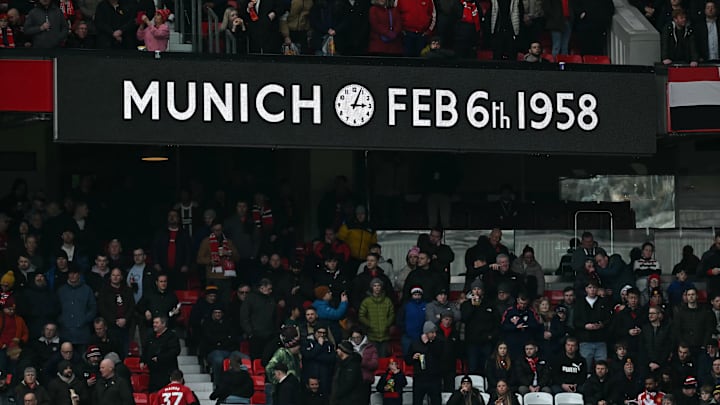The Season 3 premiere of Yellowjackets comes along at a resonant time of year, because it is 67 years and one week after the Munich air disaster, an event that has clearly had at least a small role in inspiring the TV series. Of course, the TV show has also taken cues from William Golding’s The Lord of the Flies and the real-life Andes flight disaster of 1972, which one character in the show explicitly refers to. However, the story of a high-school girls’ soccer team whose plane crashes in 1998 has its roots in a real-life soccer tragedy as well.
The 1957-58 First Division season
Manchester United were in the midst of a glorious season when February 1958 started. The team known as “Busby’s Babes” for the generation of young players brought up by manager Matt Busby had become the first English team to participate in the European Cup (the predecessor of today’s Champions League), defying the bosses at the Football Association to compete against Europe’s best teams.
They had reached the semifinals of the competition in 1957 before losing to Real Madrid, but winning the league title that same year entitled them to compete in Europe again the following year. Their win over Red Star Belgrade in the European Cup was their 11th straight win in all competitions, eliminating the Yugoslav team and getting United to the semifinals again. In England, they were six points behind Wolves with 14 games left to play in a quest for a third straight league title.
The crash
The team’s plane stopped to refuel in Munich, West Germany on Feb. 6, 1958, since it did not have the capacity to fly directly from Belgrade to Manchester. Busby wanted the team to reach the U.K. that evening so that his players would have a full day’s rest at home before resuming training for a scheduled match against Sheffield Wednesday. However, two attempts to take off were aborted by pilot James Thain and co-pilot Ken Rayment, as one engine was overaccelerating.
With snow starting to fall on the runway, the passengers were sent back to the airport lounge and United star Duncan Edwards telegraphed his landlady in Manchester telling her the flight had been canceled. However, Thain’s conversation with the station engineer convinced him that opening the throttle slowly would give the aircraft the necessary speed to take off. The passengers were reboarded, and the team’s devout Irish Catholic forward Billy Whelan was heard to say, “This may be death, but I am ready for it.”
The third attempt at takeoff was on track to reach the appropriate speed when melted snow at the end of the runway slowed the plane down too late for the pilots to abort the attempt. Rayment was heard to say, “Christ, we won’t make it” before the plane skidded off the edge of the runway, through a fence, across a road, and into a house, which tore off the left wing. (The people inside the house made it out safely.) The right side of the fuselage hit a wooden hut, causing a truck inside that was filled with tires and fuel to explode.
Rayment was pinned to his seat and told Thain to save himself. Thain promised to come back for him after putting out the fire around the cockpit, which might have caused the plane to explode. United goalkeeper Harry Gregg found a hole in the cabin and kicked it until it was large enough for him to escape, while also pulling out teammates Bobby Charlton and Dennis Viollet, the team’s leading scorer. Dead in the crash were Whelan, team captain Tommy Taylor, and five other players, as well as three coaches and two reporters who were traveling with the team.
The aftermath
Unlike the show (or the Andes air tragedy), the crash did not strand its survivors in the wilderness. Rayment and Edwards would both die of their injuries later, while players Jackie Blanchflower and Johnny Berry were so badly hurt that they would never play again. Thain survived, but he would later wish that he hadn’t, because the Munich airport authorities blamed his errors for the crash, citing his failure to de-ice the plane’s wings. In fact, there was no ice on the wings prior to takeoff, and the authorities were misled by photos of the wreckage taken after they had been lying out for hours in the snow. While Thain’s name was cleared, he would never fly again, and would retire to farm poultry.
Busby’s entire coaching staff was killed, and the man himself was badly injured enough that he was given last rites twice before he recovered. United put together a makeshift team of reserve players and new signings, but they would fall to ninth in the standings by season’s end, and they lost to AC Milan in the European Cup semifinals.
Busby would build a new generation of title-winners at Manchester United in the late 1960s, with Charlton and central defender Bill Foulkes (who also survived the crash) lining up alongside newcomers such as winger George Best and striker Denis Law. Charlton would also spearhead the offense for the only England team to win the World Cup. Like Busby, he would be knighted by the British crown for his soccer victories. United fans still mark the loss of their players and employees that decimated their team decades ago, and popular culture still remembers the accident as a sporting trauma like few others.
